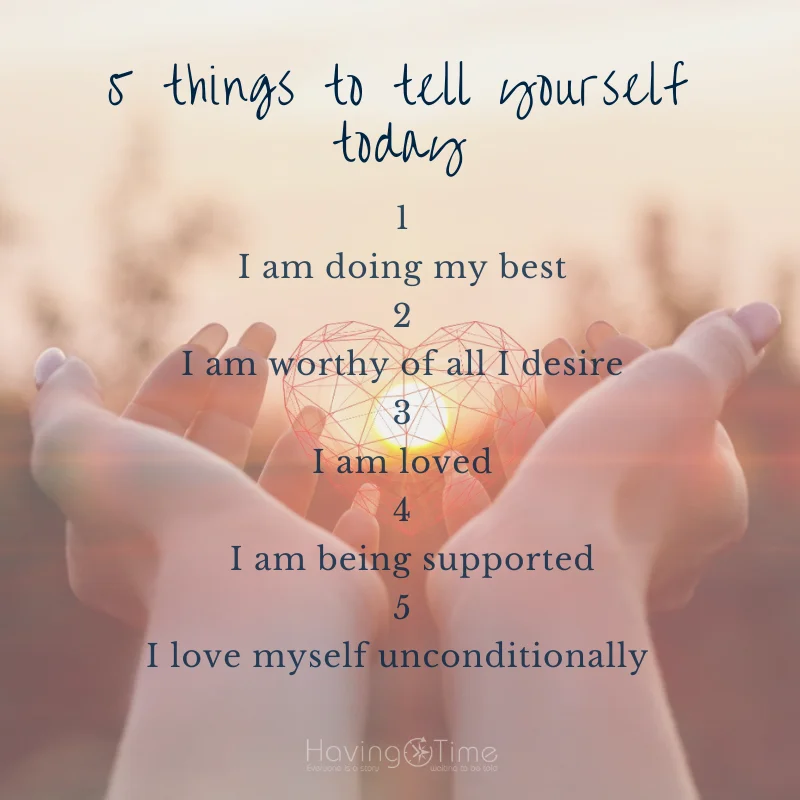Have you ever heard of kindfulness before? What is kindfulness? How do you practice it? And how can it help your health and wellness? Let’s find out.

You may be a fantastic friend to others, but what about the most important relationship? What about being a great friend to yourself? It’s time to start practicing kindfulness. Wait, what?! What is kindfulness?!
Over the last 15+ years, I have learned how damaging it can be for people to dislike themselves. So the jump-starting point here is to learn to be a great friend to the person you already are, with all your quarks and virtues, faults and imperfections.
Remember that self-compassion never depends on external circumstances. Trust me when I say that you don’t need a standing ovation to experience it. You CAN always give compassion to yourself no matter what happens in your daily life experience.
Recently, I came across the beautiful work of Ajahn Brahm, a book called ‘Kindfulness.’ What intrigued my interest was Brahm’s way of expressing the problem of separating mindfulness and compassion because, let’s face it, they work much better together.
Let’s take a closer look at mindfulness. What is mindfulness anyway? There are tonnes of definitions of mindfulness out there, sure. But let’s pick one and think of mindfulness as “cultivating a present–state awareness” that helps you to be nonreactive.
“Why is mindfulness essential? First, an achievement without appreciation is a Pyrrhic victory, and mindfulness helps cultivate appreciation. Put another way, if you can’t be happy with what you have, you’ll never be made happy by what you get. Second and related, after just a week of mindfulness practice, you will complain less, react less, and more effectively fill your life with what’s important and valuable to you.” –– Tim Ferriss
What is kindfulness?
Let’s go back to Ajahn Brahm that developed a curious term – kindfulness.
Kindfulness reminds us to be forgiving and friendly towards ourselves and others as we move along with our present state awareness practice.
To me, mindfulness without kindness is a bit dry as a prune; it becomes a bit cold and boring too. And I can’t imagine kindness without mindfulness either. How can you be kind if you’re not even remotely aware of what you’re trying to be kind to?
Most meditation teachers that I can think of, try to encourage a friendly awareness that is warm and kind. This is where the term kindfulness is of better use than mindfulness because it reminds you to be loving and forgiving, and friendly as you move along with your practice.

Try this for a moment. Sit or lay down comfortably. Now pay attention to your breathing and get curious about it. Breathe in and breathe out. Then shift your attention towards the entrance of your nostrils. Get curious about it too. No, you don’t need to push your breath or do anything fancy with it. Notice it. That’s it. And when your mind wanders off, that’s okay; that’s what our minds do. Say ‘thinking thinking’ and come back and pin your attention to your breath once again. Please, do so with a deep sense of self-compassion and without an ounce of self-criticism. And if your mind wanders off again, and it will –– simply smile, bring back your attention to the present moment. It’s all good, I promise!
Kindfulness + Present State Awareness
I’ve been practicing “present state awareness” using mindfulness meditation for years now. It started small. Ten minutes a day each morning. Then it turned into 20 minutes of morning meditation. But that’s not the point of how long you meditate for. The point is how aware you can become of each moment and what goes on in that mind of yours. Meditation is a tool that helps reduce reactivity and all the stress that comes with it. I am sharing one of my favorite meditations by Jack Kornfield below. Please give it a go and let me know what you think in the comment section below.
There are other tools that can make your daily life experience better when you look at it through the lense of kindfulness. Try this affirmation: ‘Today, I step forward to the person I already am; I befriend myself.’ Beware of putting any conditions on friendship with yourself. Because if you put conditions on your friendship towards yourself –– what happens when you cannot for whatever reason meet those self-imposed conditions?
I mean. Do you think a parent should deny a child friendship just because the child is far from perfect? Erm, of course not. Because we understand one simple thing –– harsh denial of friendship introduces an unhelpful element of pain into a child’s emotional life. And so the real question here is: why do this to yourself? Why be harsh to yourself when you CAN always choose to be friendly and kind?
Please, remember this one thing: the very person you need to be self-compassionate is the person you are right this moment.
We all struggle from time to time. We all have that pesky inner critic running in the wheel like a hamster inside of our heads that keeps us on our toes; next time it comes to the stage of your mind, take a pause and breathe deeply. Get curious. Also, know that people worldwide are going about their days perhaps with similar thoughts like “Why my life isn’t going the way I planned when I was younger?” “I shouldn’t have eaten that extra slice of pizza last night; what was I thinking?!” “I wish I didn’t say that stupid thing that was hurtful and unnecessary.” Then ask your inner critic: “HOW is this thought you are offering me is helpful? How is it constructive?” –– 9 out of 10 times, the inner critic shuts up and goes away when you ask that. So try it.
Please, remember that you are not the only person having these thoughts chasing one another. Once you realize that these thoughts are not uniquely yours, that everyone struggles from time to time, it will be easier to step forward and offer yourself much-needed self-compassion. And a much-needed realization that you can pick your thoughts just like you pick your clothes every morning.
Be well. Get curious. Practice kindfulness towards yourself and others every day!
photo source | adobe


